Ah, les petits noms d'amour! From "mon chou" or "mon beau" to "ma puce," the French language is brimming with charming, quirky, and sometimes downright bizarre terms of endearment.
Whether you're looking to woo a French lover, show affection to your grandparents, or simply add some Gallic flair to your friendships, mastering these nicknames is essential for anyone diving into French culture.
In this comprehensive guide, we'll explore 150 diverse ways to express affection in French, ranging from romantic pet names to family-friendly monikers and even some regional specialties.
You'll discover why French speakers might lovingly call their partners "my cabbage" or their children "my flea," and how these seemingly odd terms actually convey deep affection.
60 romantic terms of endearment in French

In French culture, terms of endearment play a significant role in expressing affection. These pet names can range from sweet to quirky, and understanding them can provide insight into French romantic expressions.
Boyfriend nicknames in French
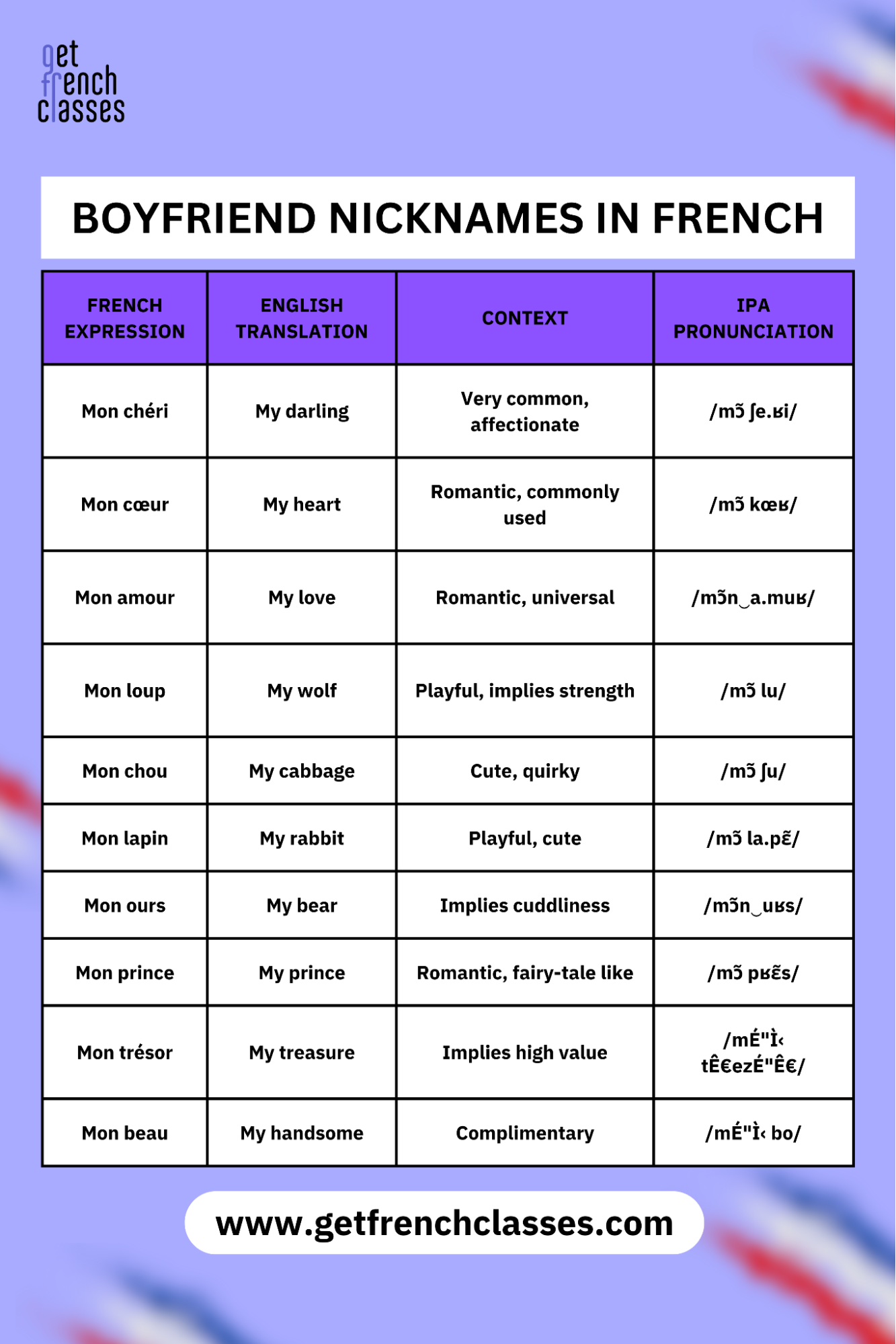
French has a variety of charming and sometimes humorous nicknames for male partners. Here's a list of popular pet names:
| French Expression | English Translation | Context | IPA Pronunciation |
|---|---|---|---|
| Mon chéri | My darling | Very common, affectionate | /mɔ̃ ʃe.ʁi/ |
| Mon cœur | My heart | Romantic, commonly used | /mɔ̃ kœʁ/ |
| Mon amour | My love | Romantic, universal | /mɔ̃n‿a.muʁ/ |
| Mon loup | My wolf | Playful, implies strength | /mɔ̃ lu/ |
| Mon chou | My cabbage | Cute, quirky | /mɔ̃ ʃu/ |
| Mon lapin | My rabbit | Playful, cute | /mɔ̃ la.pɛ̃/ |
| Mon ours | My bear | Implies cuddliness | /mɔ̃n‿uʁs/ |
| Mon prince | My prince | Romantic, fairy-tale like | /mɔ̃ pʁɛ̃s/ |
| Mon trésor | My treasure | Implies high value | /mÉ"Ì‹ tÊ€ezÉ"Ê€/ |
| Mon beau | My handsome | Complimentary | /mÉ"Ì‹ bo/ |
Examples and explanations:
-
"Mon chéri, tu veux dîner ce soir ?" (My darling, do you want to have dinner tonight?) This is a very common and affectionate way to address a male partner in everyday situations.
-
"Mon loup, tu peux m'aider avec ça ?" (My wolf, can you help me with this?) Using "mon loup" adds a playful tone and might imply that you see your partner as strong or protective.
Instead, you can use interchangeably "Mon rayon de soleil" (My ray of sunshine).
-
"Mon chou, je t'aime tellement !" (My cabbage, I love you so much!) While it might sound odd in English, "mon chou" is a sweet and endearing term in French, often used in moments of affection.
That's obviously not all . As you'll keep reading in this article, French love nicknames. So "mon homme", "mon amour", "mon saucisson", "mon gros" are some others.
Girlfriend nicknames in French: When use "mon amour," "mon petit chou," "mon rayon de soleil," or even "chou à la crème?"
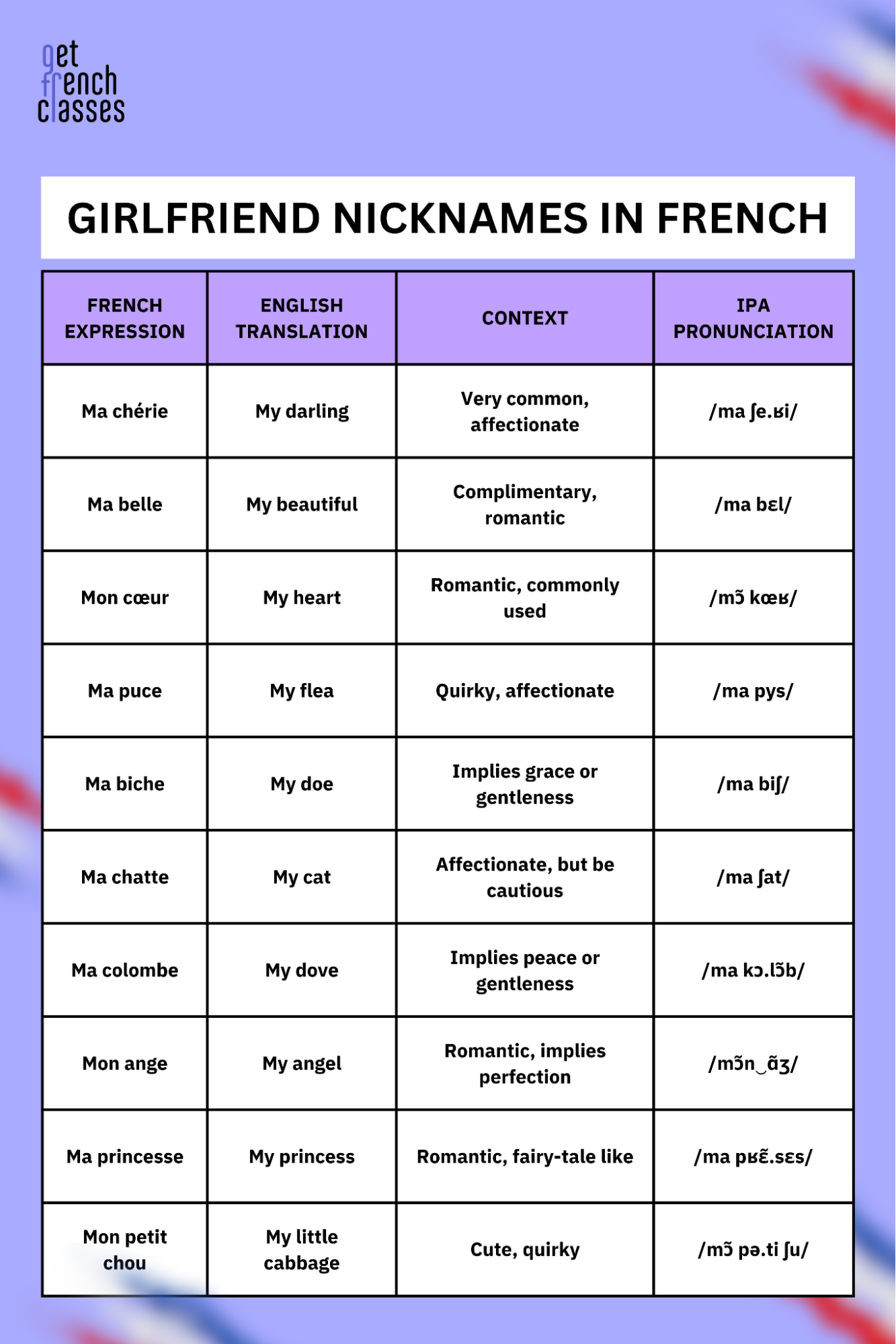
Similarly, there are numerous affectionate terms used for female friend or partners in French. Here's a selection:
| French Expression | English Translation | Context | IPA Pronunciation |
|---|---|---|---|
| Ma chérie | My darling | Very common, affectionate | /ma ʃe.ʁi/ |
| Ma belle | My beautiful | Complimentary, romantic | /ma bɛl/ |
| Mon cœur | My heart | Romantic, commonly used | /mɔ̃ kœʁ/ |
| Ma puce | My flea | Quirky, affectionate | /ma pys/ |
| Ma biche | My doe | Implies grace or gentleness | /ma biʃ/ |
| Ma chatte | My cat | Affectionate, but be cautious | /ma ʃat/ |
| Ma colombe | My dove | Implies peace or gentleness | /ma kɔ.lɔ̃b/ |
| Mon ange | My angel | Romantic, implies perfection | /mɔ̃n‿ɑ̃ʒ/ |
| Ma princesse | My princess | Romantic, fairy-tale like | /ma pʁɛ̃.sɛs/ |
| Mon petit chou | My little cabbage | Cute, quirky | /mɔ̃ pə.ti ʃu/ |
Examples and cultural context
-
Ma chérie, tu es magnifique ce soir. " ( My darling, you look magnificent tonight. This is a classic, romantic way to compliment a female partner.
-
Ma puce, on va faire des courses ? " ( My flea, shall we go shopping? While "flea" might not sound flattering in English, "ma puce" is a common, affectionate term in French language.
-
Ma biche, je suis désolé pour tout à l'heure. " ( My doe, I'm sorry about earlier. This term implies grace and gentleness, often used in tender or apologetic moments.
Note : Be cautious with "ma chatte" as it can have a vulgar connotation in some contexts.
Yes, Do you know that a little girl could have a nickname like "ma poupée", "ma perfection", "ma petite sirène?
Gender-neutral romantic nicknames in French
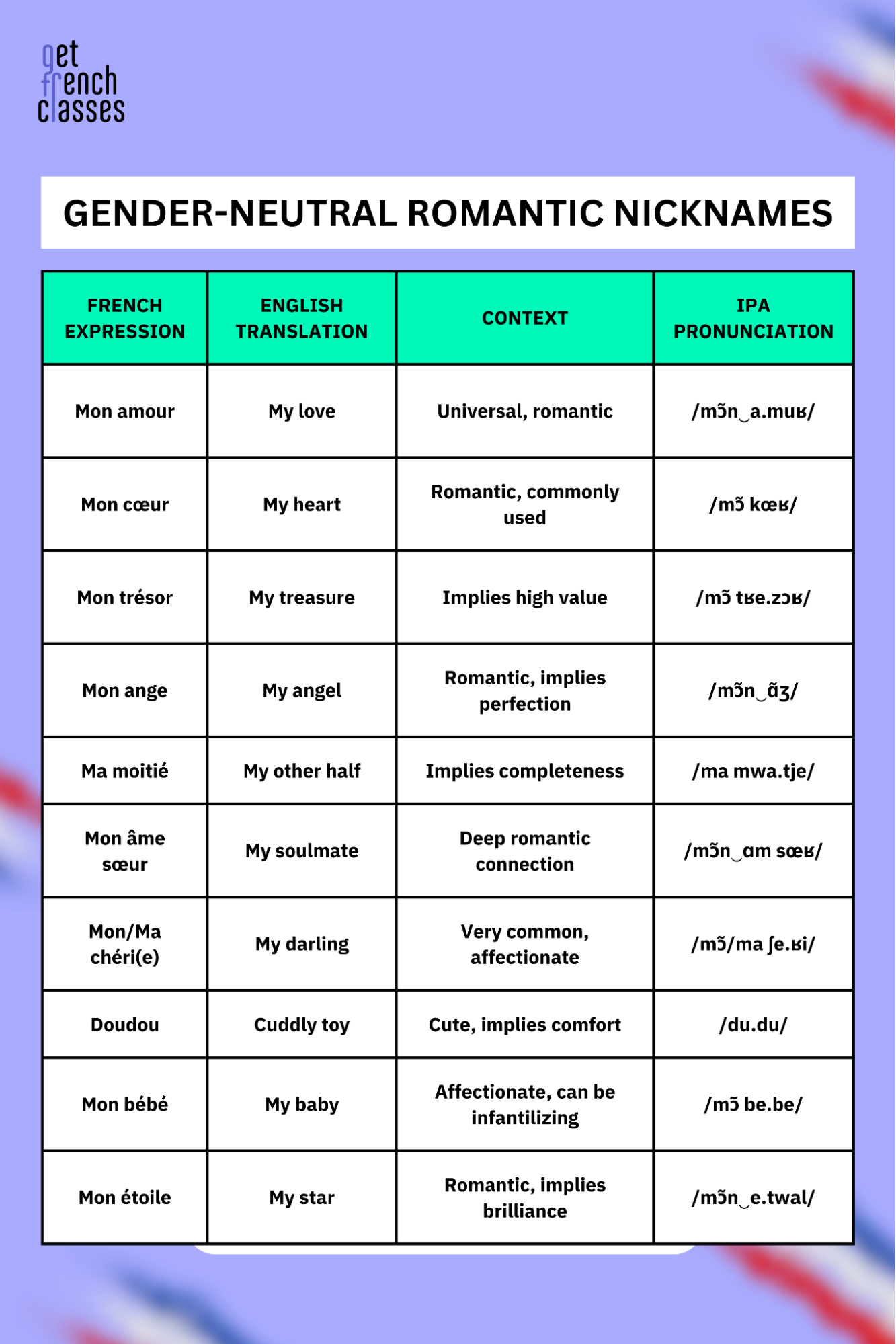
Some French terms of endearment can be used regardless of gender. Here are some options:
| French Expression | English Translation | Context | IPA Pronunciation |
|---|---|---|---|
| Mon amour | My love | Universal, romantic | /mɔ̃n‿a.muʁ/ |
| Mon cœur | My heart | Romantic, commonly used | /mɔ̃ kœʁ/ |
| Mon trésor | My treasure | Implies high value | /mɔ̃ tʁe.zɔʁ/ |
| Mon ange | My angel | Romantic, implies perfection | /mɔ̃n‿ɑ̃ʒ/ |
| Ma moitié | My other half | Implies completeness | /ma mwa.tje/ |
| Mon âme sœur | My soulmate | Deep romantic connection | /mɔ̃n‿ɑm sœʁ/ |
| Mon/Ma chéri(e) | My darling | Very common, affectionate | /mɔ̃/ma ʃe.ʁi/ |
| Doudou | Cuddly toy | Cute, implies comfort | /du.du/ |
| Mon bébé | My baby | Affectionate, can be infantilizing | /mɔ̃ be.be/ |
| Mon étoile | My star | Romantic, implies brilliance | /mɔ̃n‿e.twal/ |
Usage examples and cultural insights:
-
Mon amour, tu me manques déjà. " ( My love, I miss you already. This is a universal term that can be used for any partner, expressing deep affection.
-
Ma moitié, on est fait l'un pour l'autre. " ( My other half, we're made for each other. This term emphasizes the idea of completeness in a relationship.
-
Doudou, tu veux regarder un film ce soir ? " ( Cuddly toy, do you want to watch a movie tonight?
"Doudou" is a cute, comfort-implying term that's become popular in recent years, especially among younger couples.
A little extra : In French, the phrase "ma raison de vivre" translates to "my reason for living" and is one of all these french terms serving as nicknames. As I warned you above french love nicknames.
"Ma raison de vivre" typically is used to express deep emotional attachment or love for someone. It's a very powerful expression, often reserved for someone who gives purpose and meaning to one’s life, such as a romantic partner, a close family member, or sometimes even a child.
That was just to mention a few. Otherwise there are some other like "mon plaisir quotidien", jewel "mon bijou", and some other french words like "mon nounours" which english equivalent is "My teddy bear".
40 family terms of endearment in French
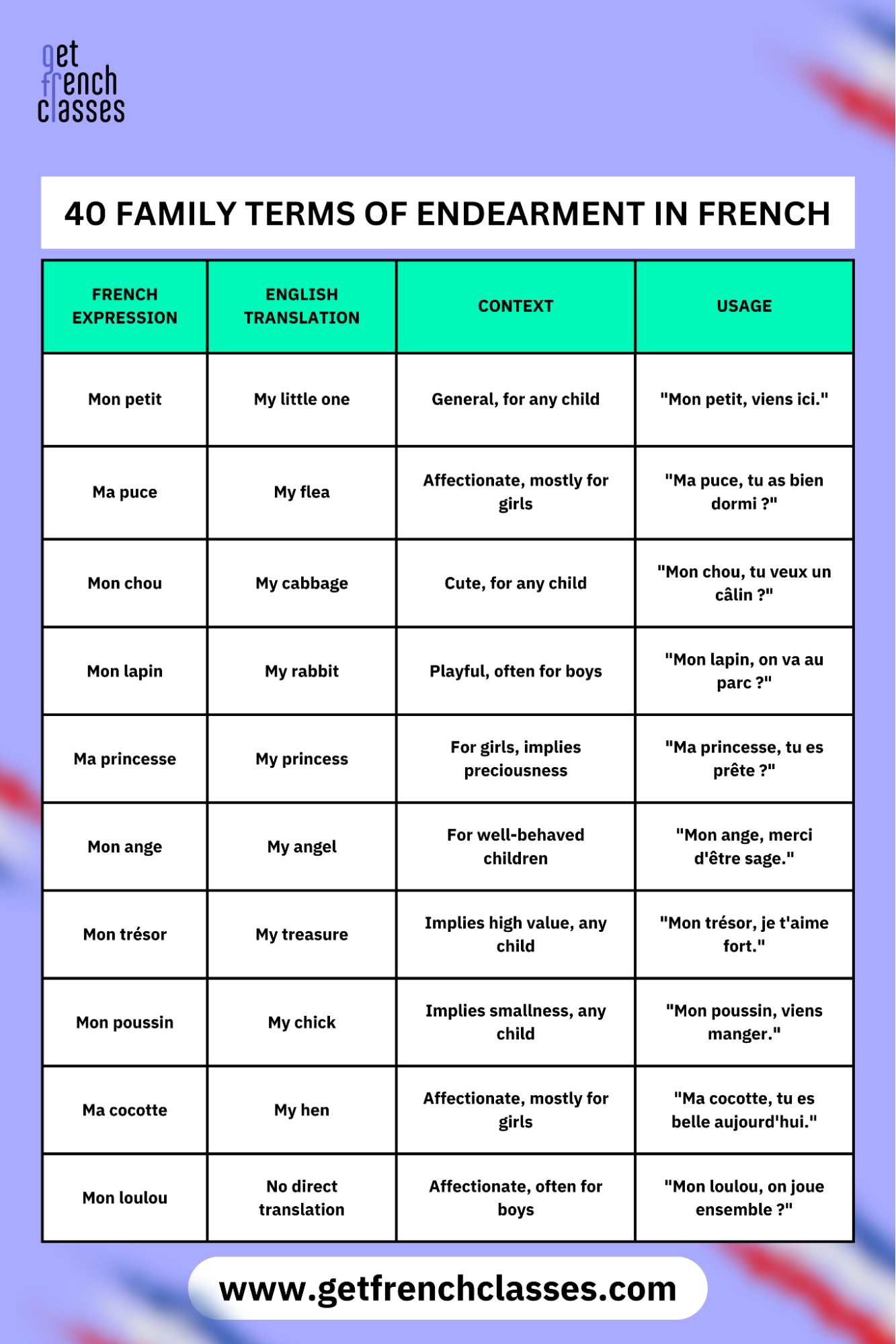
Children nicknames in French
French parents often use sweet and sometimes funny nicknames for their children. Here's a list of common pet names for kids:
| French Expression | English Translation | Context | Usage |
|---|---|---|---|
| Mon petit | My little one | General, for any child | "Mon petit, viens ici." |
| Ma puce | My flea | Affectionate, mostly for girls | "Ma puce, tu as bien dormi ?" |
| Mon chou | My cabbage | Cute, for any child | "Mon chou, tu veux un câlin ?" |
| Mon lapin | My rabbit | Playful, often for boys | "Mon lapin, on va au parc ?" |
| Ma princesse | My princess | For girls, implies preciousness | "Ma princesse, tu es prête ?" |
| Mon ange | My angel | For well-behaved children | "Mon ange, merci d'être sage." |
| Mon trésor | My treasure | Implies high value, any child | "Mon trésor, je t'aime fort." |
| Mon poussin | My chick | Implies smallness, any child | "Mon poussin, viens manger." |
| Ma cocotte | My hen | Affectionate, mostly for girls | "Ma cocotte, tu es belle aujourd'hui." |
| Mon loulou | No direct translation | Affectionate, often for boys | "Mon loulou, on joue ensemble ?" |
Examples and usage tips
-
Mon petit cœur, il est l'heure de se réveiller. " ( My little heart, it's time to wake up. This combines "mon petit" with "cœur" for extra affection, often used in gentle moments.
-
Ma puce, tu as bien travaillé à l'école aujourd'hui ? " ( My flea, did you work well at school today? Despite the literal meaning, this is a very common and affectionate way to address a child, especially a girl.
-
Mon chou, fais attention en traversant la rue. " ( My cabbage, be careful crossing the street. This quirky nickname is widely used and considered very endearing in French culture.
You could also hear things like "mon oisillon", "mon caneton", "mon petit oiseau", "mon petit monstre".
Grandparent nicknames in French
In French, grandparent nicknames can vary widely, from traditional to modern and regional variations:
| Relationship | Standard French | Regional/Alternative | IPA Pronunciation |
|---|---|---|---|
| Grandmother | Grand-mère | Mamie, Mémé, Mamine | /ɡʁɑ̃.mɛʁ/, /ma.mi/, /me.me/, /ma.min/ |
| Grandfather | Grand-père | Papi, Pépé, Papy | /ɡʁɑ̃.pɛʁ/, /pa.pi/, /pe.pe/, /pa.pi/ |
Regional variations and examples:
-
In Quebec : "Mémère" for grandmother, "Pépère" for grandfather
-
In Southern France : "Mamet" for grandmother, "Papet" for grandfather
-
Modern variations : "Mamoun" or "Mamie Nova" for grandmother, "Bon-papa" for grandfather
Cultural nuances:
-
Mamie, tu peux me raconter une histoire ? " ( Granny, can you tell me a story? "Mamie" is a very common and affectionate term for grandmother in France.
-
Pépé, on va à la pêche ce weekend ? " ( Grandpa, are we going fishing this weekend?
"Pépé" has a warm, familiar feel and is often used in casual, family settings.
-
Maminette, j'ai fait un dessin pour toi. " ( Granny dear, I made a drawing for you. Adding "-ette" to "Mamine" creates an even more affectionate diminutive form.
Nicknames for parents and siblings in French
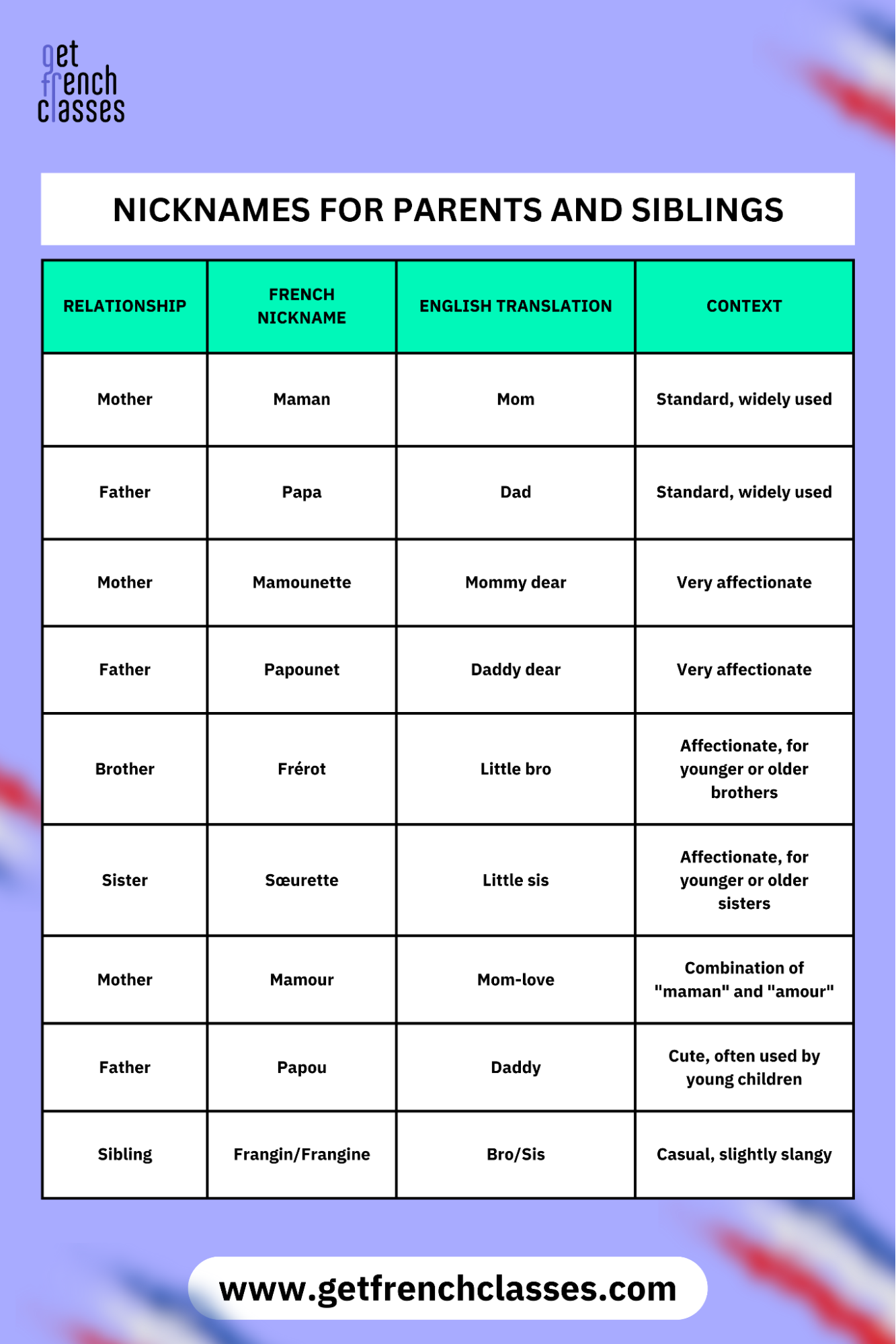
French families often use endearing terms for immediate family members. Here's a table of common nicknames:
| Relationship | French Nickname | English Translation | Context |
|---|---|---|---|
| Mother | Maman | Mom | Standard, widely used |
| Father | Papa | Dad | Standard, widely used |
| Mother | Mamounette | Mommy dear | Very affectionate |
| Father | Papounet | Daddy dear | Very affectionate |
| Brother | Frérot | Little bro | Affectionate, for younger or older brothers |
| Sister | Sœurette | Little sis | Affectionate, for younger or older sisters |
| Mother | Mamour | Mom-love | Combination of "maman" and "amour" |
| Father | Papou | Daddy | Cute, often used by young children |
| Sibling | Frangin/Frangine | Bro/Sis | Casual, slightly slangy |
Usage examples
-
Maman, qu'est-ce qu'on mange ce soir ? " ( Mom, what are we eating tonight? This is the standard way children address their mothers in France.
-
Papounet, tu peux m'aider avec mes devoirs ? " ( Daddy dear, can you help me with my homework? This very affectionate term is often used by children or adults in moments of endearment or when asking for something.
-
Frérot, on fait une partie de foot ? " ( Little bro, shall we play a game of soccer? "Frérot" can be used for both younger and older brothers, emphasizing closeness rather than age.
-
Sœurette, je peux t'emprunter ta robe ? " ( Little sis, can I borrow your dress? Like "frérot," "sœurette" is used regardless of age, showing affection between siblings. And Guess what? Such french terms of endearment are endless.
30 funny and quirky French nicknames
Food-inspired nicknames in French
The French love of food extends to their terms of endearment, resulting in some delightfully quirky nicknames.
| French Nickname | Literal Translation | Context | Usage Example |
|---|---|---|---|
| Mon chou | My cabbage | Widely used term of endearment | "Mon chou, tu veux sortir ce soir ?" |
| Ma tartiflette | My tartiflette (cheese and potato dish) | Implies coziness and comfort | "Viens là, ma tartiflette, on va regarder un film." |
| Mon petit quatre-heures | My little 4 o'clock snack | Often used for children | "Mon petit quatre-heures, c'est l'heure du goûter !" |
| Ma crêpe | My pancake | Implies sweetness | "Ma crêpe, tu es adorable aujourd'hui." |
| Mon bonbon | My candy | Used for someone sweet | "Tu me manques, mon bonbon." |
Explanations and origins:
-
"Mon chou" originates from the pastry "chou à la crème" and implies sweetness and delicacy.
-
"Ma tartiflette" is a hearty, comforting dish, so this nickname implies warmth and coziness.
-
"Quatre-heures" refers to the traditional afternoon snack time for French children.
Animal-inspired nicknames in French
Animal-inspired nicknames are common in French and often carry cultural significance.
| French Nickname | Literal Translation | Cultural Significance | Usage Example |
|---|---|---|---|
| Ma puce | My flea | Implies small and dear | "Ma puce, tu as bien dormi ?" |
| Mon lapin | My rabbit | Implies cuddly and cute | "Viens ici, mon lapin, je veux te faire un câlin." |
| Ma biche | My doe | Implies grace and beauty | "Ma biche, tu es ravissante ce soir." |
| Mon canard | My duck | Often used affectionately by older generations | "Mon canard, passe-moi le sel s'il te plaît." |
| Mon poussin | My chick | Implies small and young | "Mon poussin, fais attention en traversant la rue." |
Cultural insights and usage tips:
-
"Ma puce" is widely used despite its literal meaning, showing how disconnected these nicknames can be from their origins.
-
"Ma biche" was popularized by the film "La Grande Vadrouille" and has since become a common term of endearment.
-
Be cautious with "ma chatte" (my female cat) as it can have vulgar connotations.
The bonus : As french love nicknames, it's not astonishing to hear them use "ma poule", doe ma biche".. as french terms of endearment.
Unusual and creative nicknames in French
French also has some truly unique and creative nicknames that defy easy categorization.
| French Nickname | Literal Translation | Origin/Meaning | Usage Context |
|---|---|---|---|
| Mon doudou | My cuddly toy | From child's comfort object | "Mon doudou, tu me réconfortes toujours." |
| Ma louloutte | My little wolf (feminine) | Playful derivation of "loup" (wolf) | "Ma louloutte, on va se promener ?" |
| Mon bibi | My little one | Possibly from "biberon" (baby bottle) | "Mon bibi, tu grandis si vite !" |
| Ma crevette | My shrimp | Implies small and cute | "Ma crevette, viens manger !" |
| Mon Kinder Surprise | My Kinder Surprise | Implies sweet and full of surprises | "Tu es mon Kinder Surprise, toujours plein de surprises !" |
Explanations and usage:
-
"Doudou" has expanded from children's usage to become a common term of endearment between adults.
-
"Bibi" is often used in a slightly self-deprecating way, as in "C'est bibi qui s'y colle" (It's little old me who's going to do it).
-
"Kinder Surprise" is a modern nickname that shows how brand names can become terms of endearment.
There is this unsual way of setting nickname which mostly used on social media and by Gen Z. They do not only a combination of two diofferent languages but also change words places. Things like "treasure mon", "rabbit mon", "lamb mon", "duck mon", egg mon", "chicken mon", "doll ma poupée" , "doll ma poupette"
Regional variations in French nicknames
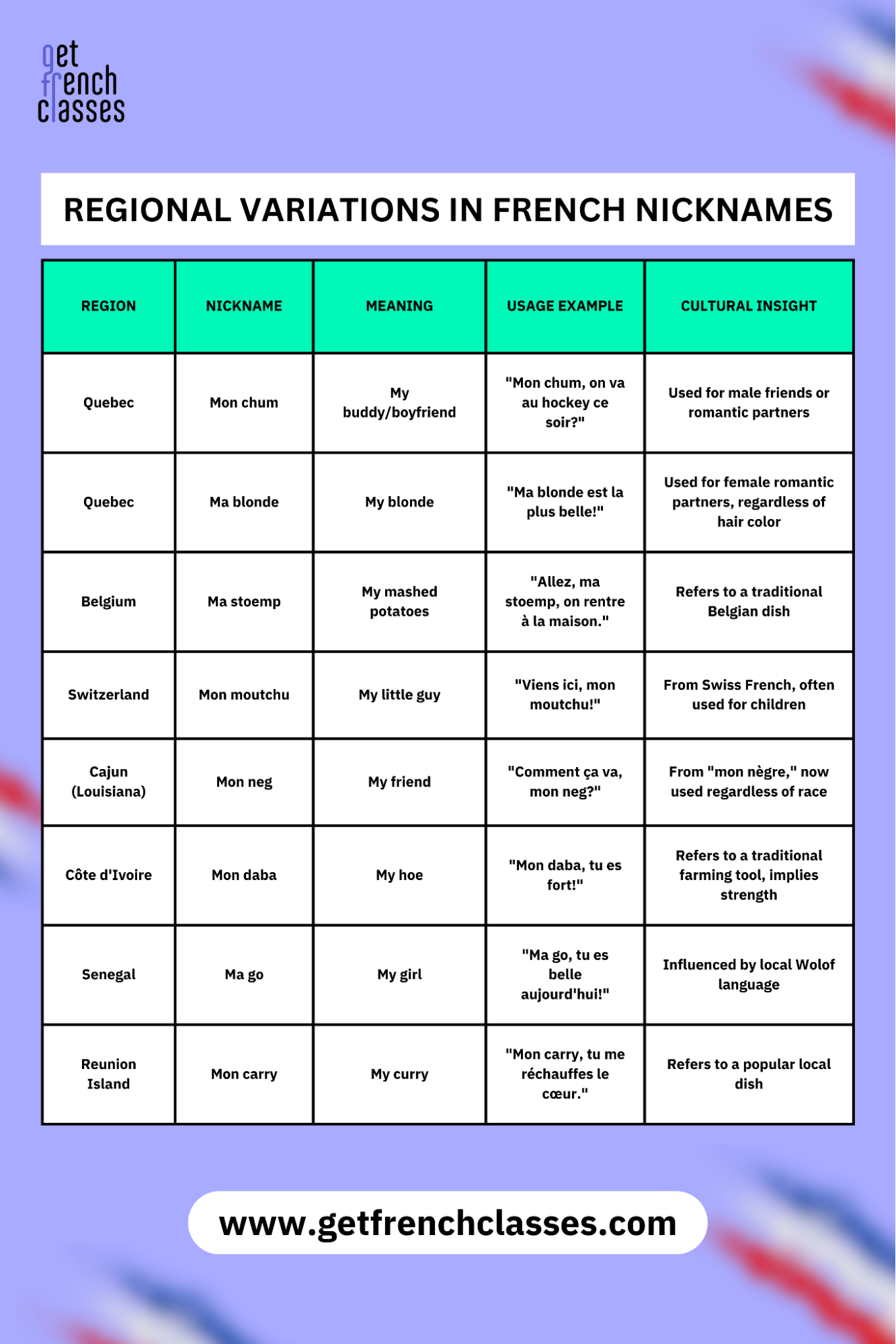
French-speaking regions around the world have developed their own unique terms of endearment and nicknames. These variations reflect local culture, history, and linguistic influences.
| Region | Nickname | Meaning | Usage Example | Cultural Insight |
|---|---|---|---|---|
| Quebec | Mon chum | My buddy/boyfriend | "Mon chum, on va au hockey ce soir?" | Used for male friends or romantic partners |
| Quebec | Ma blonde | My blonde | "Ma blonde est la plus belle!" | Used for female romantic partners, regardless of hair color |
| Belgium | Ma stoemp | My mashed potatoes | "Allez, ma stoemp, on rentre à la maison." | Refers to a traditional Belgian dish |
| Switzerland | Mon moutchu | My little guy | "Viens ici, mon moutchu!" | From Swiss French, often used for children |
| Cajun (Louisiana) | Mon neg | My friend | "Comment ça va, mon neg?" | From "mon nègre," now used regardless of race |
| Côte d'Ivoire | Mon daba | My hoe | "Mon daba, tu es fort!" | Refers to a traditional farming tool, implies strength |
| Senegal | Ma go | My girl | "Ma go, tu es belle aujourd'hui!" | Influenced by local Wolof language |
| Reunion Island | Mon carry | My curry | "Mon carry, tu me réchauffes le cœur." | Refers to a popular local dish |
Cultural insights and usage examples
-
In Quebec: Mon chum pis ma blonde vont venir souper à soir. " ( My boyfriend and girlfriend are coming for dinner tonight. This usage of "chum" and "blonde" for romantic partners is unique to Quebec French and can be confusing for other French speakers.
-
In Belgium: Ma petite frite, viens faire un bisou à maman. " ( My little fry, come give mom a kiss. Belgian French often incorporates food-related nicknames, reflecting the country's culinary culture.
-
In Switzerland: Dis donc, mon moutchu, t'as bien grandi! " ( Well, my little guy, you've grown a lot! Swiss French retains some unique words from older forms of French, like "moutchu."
French nicknames in popular culture

French literature, films, and music have popularized many nicknames that have become part of the cultural lexicon. These nicknames often reflect aspects of French culture and have influenced everyday language.
| Nickname | Source | Meaning/Context | Cultural Impact |
|---|---|---|---|
| Cosette | Les Misérables (Victor Hugo) | Diminutive of Euphrasie | Symbolizes innocence and hardship |
| Tintin | The Adventures of Tintin (Hergé) | Derived from Martin | Represents adventure and quick-wittedness |
| Amélie | Le Fabuleux Destin d'Amélie Poulain (film) | Diminutive of Amelia | Embodies whimsical Parisian charm |
| Bébert | Les Valseuses (film) | Diminutive of Albert | Used humorously for troublemakers |
| Bouboule | Various sources | Literally "little ball" | Affectionate term for chubby people |
| Coco | Coco Chanel | Nickname for Gabrielle | Symbolizes elegance and fashion |
| Loulou | Various sources | Derived from Louis | General term of endearment |
| Titi | Parisian slang | Young Parisian street kid | Represents street-smart Parisian youth |
| Zazou | 1940s subculture | Jazz enthusiast | Symbolizes rebellious youth culture |
| Fifi | Various sources | Diminutive of Philippe | Often used for pets, especially poodles |
Examples and cultural reflections
-
"Cosette" from Les Misérables: This nickname has become synonymous with a young, innocent girl facing hardship. It's sometimes used in everyday language to describe someone in a difficult situation: "Ne fais pas ta Cosette!" (Don't act like Cosette! / Don't be so pitiful!)
-
"Tintin": While originally a character name, it's now used to describe someone who's adventurous or always getting into scrapes. "Il est comme Tintin, toujours en train de résoudre des mystères." (He's like Tintin, always solving mysteries.)
-
"Amélie": After the success of the film, this name became associated with quirky, charming Parisian women. It influenced baby naming trends and is sometimes used to describe a whimsical, romantic atmosphere: "Ce café a un vrai style Amélie." (This café has a real Amélie style.)
-
"Bouboule": While it can be used affectionately, it's important to note that this nickname can be sensitive if used for someone who's self-conscious about their weight.
-
"Zazou": This term, originating from a 1940s subculture, is sometimes still used to describe someone with an eccentric or non-conformist style: "Regarde ce zazou avec son chapeau!" (Look at that zazou with his hat!)
French nicknames and terms of endearment FAQ
Is it common for French people to use nicknames?
Yes, nicknames are quite common in French culture, especially among family members, friends, and romantic partners. However, their use in professional settings is less common than in some English-speaking countries.
Why are food items often used as terms of endearment in French?
Food plays a significant role in French culture. Using food-related nicknames reflects the importance of culinary traditions and adds a touch of sweetness or comfort to the term of endearment. For example, "mon chou" (my cabbage) is a very common and affectionate nickname.
Are animal-based nicknames considered insulting in French?
Generally, no. Many animal-based nicknames like "mon lapin" (my rabbit) or "ma biche" (my doe) are considered affectionate. However, as with any language, context and tone are important.
How do I know when it's appropriate to use a nickname in French?
Nicknames are typically used in informal settings with people you know well. It's best to wait until you have an established relationship before using nicknames, especially the more unique or personal ones.
Are there any nicknames I should avoid using in French?
Be cautious with nicknames that could have double meanings or vulgar connotations, like "ma chatte" (my cat, but also a vulgar term). Also, avoid using overly familiar nicknames with people you don't know well, especially in professional contexts.
Do French people use English nicknames?
While French people generally prefer French nicknames, some English terms like "baby" or "honey" have become popular, especially among younger generations. However, they're often pronounced with a French accent not like english speakers do.
Are diminutives common in French nicknames?
Yes, diminutives are quite common. They're often formed by adding suffixes like "-ette" (e.g., "ma poulette" - my little chicken) or "-ou" (e.g., "chouchou" - darling).
How do nicknames differ in various French-speaking regions?
You know what? French love nicknames. And each French-speaking region has its unique nicknames. For example, in Quebec, "ma blonde" means "my girlfriend" regardless of hair color, while this wouldn't be understood the same way in France.
Can I create my own French nickname for someone?
Absolutely! Many French nicknames are creative and personal. Feel free to create your own, but make sure it's appropriate and well-received by the person you're nicknaming.
Are there gender-neutral nicknames in French?
Yes, there are. Terms like "mon amour" (my love), "mon cœur" (my heart), or "mon ange" (my angel) can be used regardless of gender.
How important is it to use the correct possessive pronoun (mon/ma/mes) with nicknames?
It's quite important for grammatical correctness. "Mon" is used before masculine nouns, "ma" before feminine nouns, and "mes" for plural. For example, "mon chou" (masculine) but "ma puce" (feminine).
